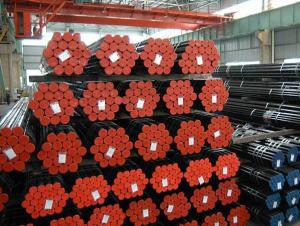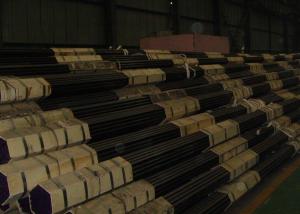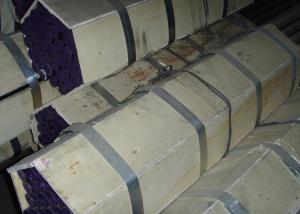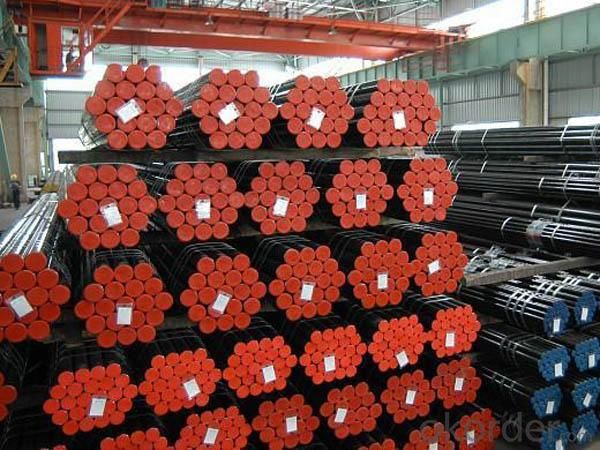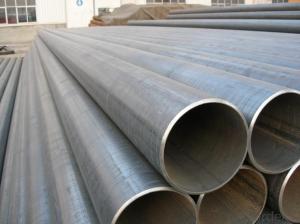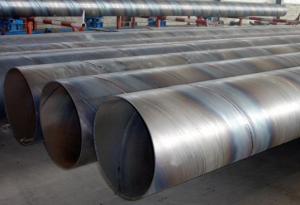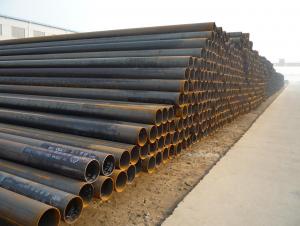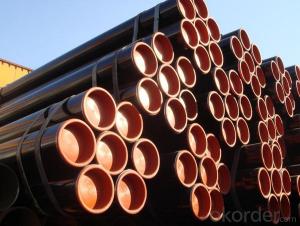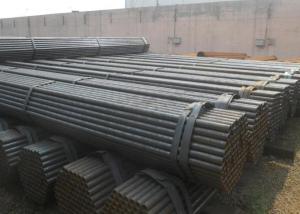High Quality JIS G3455(Carbon Steel Pipes For High Pressure Service)
- Loading Port:
- China Main Port
- Payment Terms:
- TT or LC
- Min Order Qty:
- 15M.T. m.t.
- Supply Capability:
- 5000 Tons Per Month m.t./month
OKorder Service Pledge
OKorder Financial Service
You Might Also Like
Specifications of High Quality JIS G3455 (Carbon Steel Pipes For High Pressure Service)
Standard: JIS G3455
Grade: STS 38, STS 42, STS 49.
OD: 10.5-660.4 mm.
Thickness: 1.7-64.2mm
Length:39.34'/12M.max...
Usage/Application of High Quality JIS G3455 (Carbon Steel Pipes For High Pressure Service)
It can be used for transmitting a large number of fluids. Such as oil, natural gas, water and some solid materials. At the same time it can be widely used as the manufacture of various structural parts and mechanical parts, such as the drill pipe, automotive transmission shaft, as well as building construction.
Packaging/Delivery of High Quality JIS G3455 (Carbon Steel Pipes For High Pressure Service)
Wrapped in bundles with steel strips or according to customers' requirements.
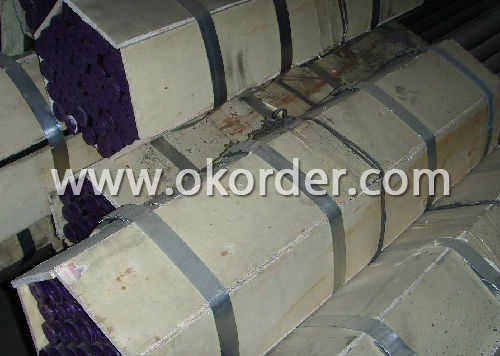
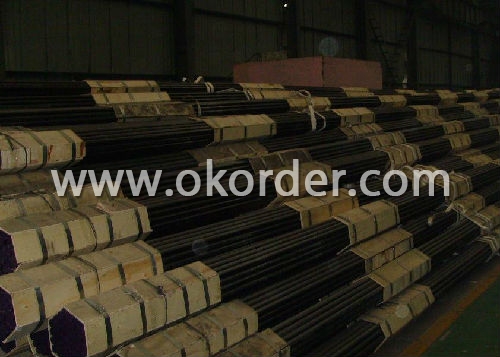
- Q: What does "steel pipe SC" mean?
- SC is an ordinary welded pipe, equal to water professional DN, SC is welded steel pipe concealed, general pipe wall is relatively thick, S represents pipe material, C represents laying mode, TC stands for wire pipe concealed, pipe wall is thinner.
- Q: How are steel pipes used in the manufacturing of HVAC systems?
- Steel pipes are commonly used in the manufacturing of HVAC systems for various purposes. They are primarily used for transporting fluids such as water, refrigerants, and gases throughout the system. Steel pipes provide durability and strength, ensuring the safe and efficient transfer of these substances. Additionally, steel pipes are often used for structural support, acting as a framework for the HVAC system. Overall, steel pipes play a crucial role in the manufacturing of HVAC systems by facilitating fluid transportation and providing structural stability.
- Q: Are the welded and galvanized tubes the same weight?
- The difference is that because zinc has weight, even if the difference is very small, there are also differences,Galvanized pipe weight is basically the same about 1.06 of the welded tube, of course, you can artificially ignored.
- Q: How can galvanized steel tubes be painted on the surface?
- The market is commonly used in alkyd iron red primer, iron red epoxy primer are not suitable for galvanized parts, otherwise it is easy to fall off. It is important to point out that the saponification of the galvanized sheet with alcohol, acid and paint will result in the failure of the coating and the damage of the original zinc coating.
- Q: How are steel pipes used in fire protection systems?
- Steel pipes are an integral part of fire protection systems, primarily used for the distribution of water or other fire suppressants in buildings. These pipes are known for their strength, durability, and resistance to high temperatures, making them ideal for withstanding the intense conditions of a fire. In fire protection systems, steel pipes are commonly used to create a network of pipes that deliver water to sprinkler heads or fire hydrants throughout a building. This network ensures that water is readily available to suppress or extinguish a fire in case of an emergency. One of the key advantages of steel pipes in fire protection systems is their ability to withstand the high pressure and flow rates required for effective fire suppression. Steel pipes can handle the forceful water flow needed to quickly and efficiently distribute water to the affected areas, helping to control and extinguish the fire as soon as possible. Additionally, steel pipes are resistant to corrosion, which is essential for maintaining the integrity of the fire protection system over time. Corrosion can weaken pipes, leading to leaks or even complete failure, which can be catastrophic in a fire situation. Steel pipes, however, have a longer lifespan and require less maintenance compared to other pipe materials, ensuring the system remains reliable and functional for years to come. Furthermore, steel pipes are often used in fire protection systems due to their fire resistance properties. Steel is inherently fire-resistant, meaning it can withstand high temperatures without deforming or losing its structural integrity. This is crucial in fire protection systems as it allows the pipes to remain intact and continue delivering water even in the midst of a fire, ensuring the safety of occupants and minimizing damage to the building. In summary, steel pipes play a vital role in fire protection systems by ensuring a reliable and efficient distribution of water or fire suppressants. Their strength, durability, resistance to high temperatures, and corrosion resistance make them an ideal choice for effectively combating fires and safeguarding lives and property.
- Q: How are steel pipes used in firefighting systems?
- Steel pipes are used in firefighting systems to transport water or other fire-suppressing agents from a water source to the location of a fire. These pipes are durable and resistant to heat, making them suitable for carrying large volumes of water at high pressure to extinguish fires effectively. Additionally, steel pipes are often used for underground or overhead fire hydrant systems, sprinkler installations, and standpipe systems in buildings to ensure a reliable and efficient firefighting infrastructure.
- Q: What is the cost of steel pipes compared to other materials?
- The cost of steel pipes can vary depending on various factors such as size, grade, and market conditions. However, generally speaking, steel pipes tend to be more cost-effective compared to other materials like copper or PVC. Steel is a durable and versatile material that offers exceptional strength and longevity, making it a popular choice for various applications.
- Q: Can steel pipes be used for wastewater treatment facilities?
- Yes, steel pipes can be used for wastewater treatment facilities. Steel pipes are known for their durability, corrosion resistance, and high strength, which makes them suitable for handling various types of wastewater and harsh chemicals. Additionally, steel pipes can be easily welded, allowing for flexibility in design and installation.
- Q: What are the factors affecting the price of steel pipes?
- The price of steel pipes can be influenced by various factors. These factors encompass: 1. Raw material expenses: The cost of raw materials like iron ore and coal significantly influences the price of steel pipes. Fluctuations in commodity prices can impact the overall production cost and subsequently affect the selling price. 2. Supply and demand dynamics: The price of steel pipes is determined by the interplay of supply and demand. When there is high demand and limited supply, prices tend to rise. Conversely, an oversupply and low demand can lead to price decreases. 3. Production and manufacturing costs: The direct impact of production and manufacturing expenses on steel pipe prices cannot be overlooked. Costs related to labor, energy, transportation, and equipment maintenance all contribute to the overall production cost and, consequently, the selling price. 4. Market competition: The level of competition within the steel pipe industry also influences prices. Increased competition among manufacturers and suppliers can result in more competitive pricing. Conversely, fewer competitors may lead to higher prices due to limited options. 5. Government policies and regulations: Government policies and regulations exert a significant influence on steel pipe prices. Import tariffs, trade restrictions, and environmental regulations can all affect production costs and subsequently impact prices. 6. Currency exchange rates: Currency exchange rates can also sway steel pipe prices. Fluctuations in exchange rates between countries can impact the cost of importing or exporting steel pipes, which in turn affects their selling price. 7. Global economic conditions: The overall state of the global economy can have repercussions on steel pipe prices. During periods of economic growth, demand for steel pipes may increase, leading to higher prices. Conversely, economic downturns can result in decreased demand and subsequently lower prices. It is vital to acknowledge that these factors can interact and fluctuate over time, making the pricing of steel pipes a complex and ever-changing process.
- Q: What are the different methods of joining steel pipes for oil and gas pipelines?
- There are several different methods of joining steel pipes for oil and gas pipelines, including welding, threading, and flange connections. Welding involves heating the ends of the pipes and fusing them together, creating a strong and durable joint. Threading is a process where the ends of the pipes are threaded and screwed together, providing a secure connection. Flange connections involve using flanges, which are flat, circular discs with holes in the center, to connect the pipes. The flanges are bolted together, creating a tight seal. These methods are commonly used in the construction of oil and gas pipelines to ensure reliable and leak-free connections.
1. Manufacturer Overview
| Location | Wuxi, China |
| Year Established | 1991 |
| Annual Output Value | 300,000Tons |
| Main Markets | Europe; Southeast Asia; etc. |
| Company Certifications | API 5L;API 5CT;API Q1;ISO/TS29001 |
2. Manufacturer Certificates
| a) Certification Name | |
| Range | |
| Reference | |
| Validity Period |
3. Manufacturer Capability
| a) Trade Capacity | |
| Nearest Port | Wuxi; Shanghai |
| Export Percentage | 41% - 50% |
| No.of Employees in Trade Department | 3900-4000 People |
| Language Spoken: | English; Chinese; Spanish |
| b) Factory Information | |
| Factory Size: | Above 450,000 square meters |
| No. of Production Lines | Above 10 |
| Contract Manufacturing | OEM Service Offered;Design Service Offered |
| Product Price Range | Average |
Send your message to us
High Quality JIS G3455(Carbon Steel Pipes For High Pressure Service)
- Loading Port:
- China Main Port
- Payment Terms:
- TT or LC
- Min Order Qty:
- 15M.T. m.t.
- Supply Capability:
- 5000 Tons Per Month m.t./month
OKorder Service Pledge
OKorder Financial Service
Similar products
Hot products
Hot Searches
Related keywords
